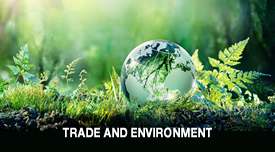The fisheries sector represents one of the oldest economic activities carried out by the human race and remains one of the most relevant for many developing countries. Indeed, fisheries often account for between 5 and 10 per cent of GDP and exports for many LDCs and SIDS. Globally, fish is the most traded animal protein commodity and is a particularly important source of nutrition and protein for coastal populations, as well as being fundamental to their livelihoods. Despite this, we see today that around 31.4% of fish stocks are estimated as fished at biologically unsustainable levels, a proportion that has been steadily increasing over recent decades. Recognized drivers of this trend are overfishing, illegal, unreported and unregulated (IUU) fishing activities, the existence of harmful incentives including certain types of fisheries subsidies, and the impacts of climate change.
Under Sustainable Development Goal (SDG) 14, three targets explicitly focus on the trade-related aspects of fisheries:Target 14.4: By 2020, effectively regulate harvesting and end overfishing, illegal, unreported and unregulated fishing and destructive fishing practices and implement science-based management plans, in order to restore fish stocks in the shortest time feasible, at least to levels that can produce maximum sustainable yield as determined by their biological characteristics;
- Target 14.6: By 2020, prohibit certain forms of fisheries subsidies which contribute to overcapacity and overfishing, eliminate subsidies that contribute to illegal, unreported and unregulated fishing and refrain from introducing new such subsidies, recognizing that appropriate and effective special and differential treatment for developing and least developed countries should be an integral part of the World Trade Organization fisheries subsidies negotiation;
- Target 14.b: Provide access for small-scale artisanal fishers to marine resources and markets.
In 2017, there will be two landmark conferences that could have significant bearing in helping the international community advance these targets, namely:
- High Level United Nations Conference to Support the Implementation of Sustainable Development Goal 14: Conserve and sustainably use the oceans, seas and marine resources for sustainable development (New York, June 2017), co-hosted by the Governments of Fiji and Sweden; and
- 11th WTO Ministerial Conference (Buenos Aires, December 2017).
Outline of the event
With the purpose of fostering debate and developing specific policy options and novel ideas that would feed into both processes in the realm of fisheries, UNCTAD will be organising two parallel oceans events.
The first will be a Briefing on "The fisheries regulatory framework at multilateral level and preparations to the U.N. High Level Oceans Conference 2017" in order to provide clarity on the main obligations and functioning of the multilateral legal framework applicable to fisheries and the development of the process leading to the 2017 UN Oceans Conference. This event is the result of a request made by participants during a previous briefing on the 2017 UN Oceans Conference.
The second event will be the Oceans Forum on trade-related aspects of SDG 14, which will seek discuss policy and regulatory options for advancing the implementation of trade in fish related targets under SDG 14 by drawing on global, regional and cross-country experiences, sharing lessons, sensitising development partnerships and designing more effective support measures.
These events will also seek to advance and implement the mandate given under paragraph 100 (t) of Nairobi Maafikiano (Consensus): "in cooperation with other relevant international organizations and other stakeholders should support developing countries UNCTAD, in particular SIDS, in the advancement of Sustainable Development Goal 14 in the design and implementation of regional and/or national economic development strategies for the conservation and sustainable use of oceans and their resources seeking to promote sustainable trade in ocean-based sectors including through analysis of fisheries subsidies that lead to overcapacity and overfishing and subsidies that contribute to illegal, unreported and unregulated fishing and the challenges they pose to developing countries, particularly in connection with the conservation of marine resources and food security. "
Finally, the forum will also explore options to implement the UNCTAD-FAO-UNEP Statement on Fisheries Subsidies, which is supported by 91 countries, 4 IGOs and more than 15 Global Civil Society Organisations. UNCTAD, FAO and UNEP will be working with its traditional partners on Oceans Economy and fisheries, especially the Commonwealth Secretariat, the ACP Group and International Oceans Institute (IOI). The results and recommendations of the Forum will be directly channelled by United Nations and its partners to both the United Nations and WTO processes. All presentations during these two events will be followed by discussions. On the UNCTAD side this will be a DITC and ALDC event.








